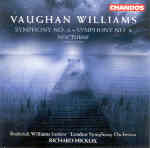Something just isn’t right with Hickox and Chandos. The last few releases in this cycle have been mediocre to dreadful, and it’s difficult to understand why, given the performers’ evident familiarity with this repertoire. Hickox launches the Sixth Symphony with admirable ferocity, but once the second subject gets going the music passes by in a blur, lacking rhythm, point, and the emotional complexity (is this simple “jollity” or “laughter through tears”?) that you will find in virtually any other performance. Compare this movement with Bakels and the Bournemouth Symphony on Naxos and you’ll find in the latter about twice the bite and impact at tempos almost exactly the same.
Similarly, the second movement opens well, but the central section progressively slows down and all tension dissipates, and what else is this passage about but “tension”? The big triple climax seldom has been so poorly captured, the melody buried behind the trumpets and drums, and what ought to be a cataclysmic cymbal crash is swamped in the cavernous acoustic of the Church of All Saints, Tooting. That same acoustic turns the scherzo into a near total mess of garbled textures. Music meant to sound evil merely sounds like random confusion–Vaughan Williams meets John Cage. The final Epilogue is well paced but lacking in mystery and it rapidly grows too loud as successive voices enter. This isn’t as bad as Hickox’s really awful rendition of A Pastoral Symphony, but it’s pretty mediocre by any standard.
Symphony No. 8 doesn’t go much better. The opening Fantasia probably comes off best, the successive variations decently characterized; but even here the climax sounds muddy and lacking in rhythmic potency. The scherzo is clearly too quickly paced for such a reverberant space. Listen to how the opening melody in the bassoons has as much clicking of keys as actual tone, and no rhythmic definition whatsoever. How is this sort of thing possible from this label and these players? After a slow and limply phrased Cavatina, the slightly ponderous reading of the finale proves the biggest disappointment of all. Where is the vibraphone in those lovely solo passages that Vaughan Williams wrote for it? (Boult on EMI is unmatched here.) And what on earth led Hickox to choose “tuned” gongs that have more splash and less tone than suspended cymbals or many tam-tams? The resulting fog of resonance turns the rhythms, textures, and colors of this brilliant music into a monochromatic sonic blur (compare to Boult, Slatkin, or Handley, all of whom get this obvious point absolutely right).
Nocturne, a pretty Whitman setting for baritone and orchestra lasting for about eight minutes and dating from 1908, was discovered only in 2000. Roderick Williams sings it sincerely, and it’s the best performance on the disc–but hardly reason to buy it. As you no doubt have already surmised, Hickox’s interpretive problems are only aggravated by the over-reverberant sonics, which also swallow the bass drum and in general turn the orchestra’s low end to sludge. Chandos has done such fine work over the years on behalf of British music that it’s genuinely sad to see this seeming decline in quality and standards. These performances ought to represent a crowning achievement for the label, but as it stands the crown jewels seem to be made of paste.
































